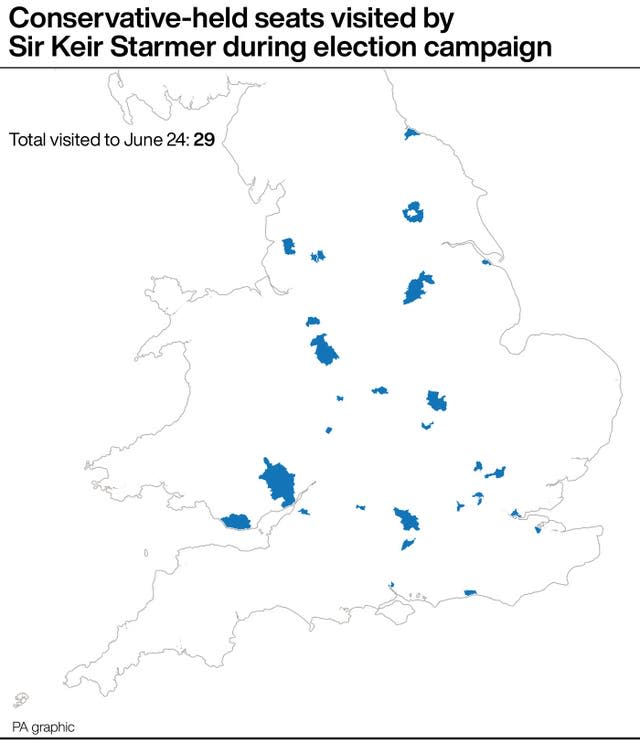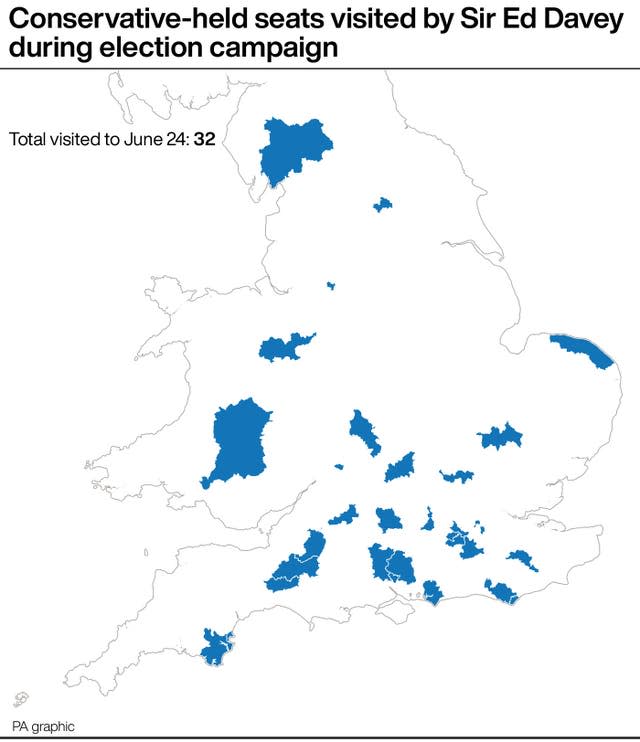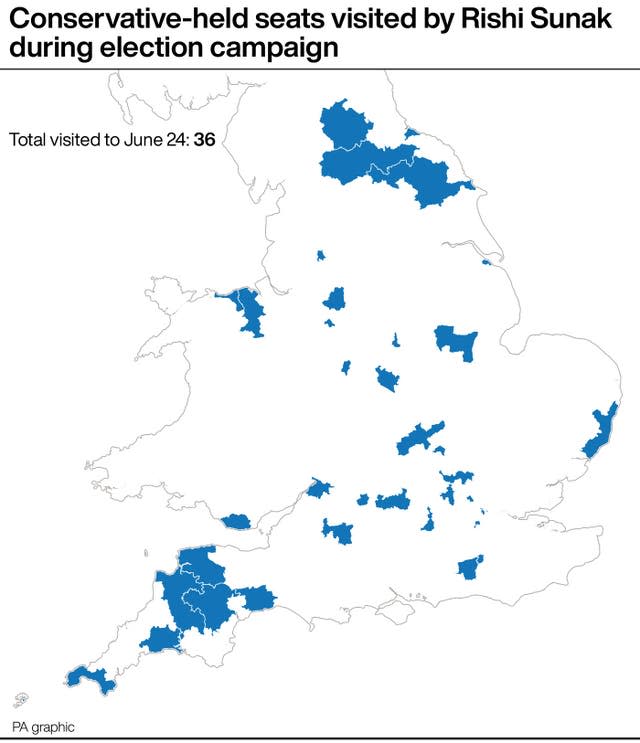Seats visited by party leaders on day 33: Key election data
All three of the main party leaders were on the campaign trail on Monday, visiting battleground seats ranging from an ultra-marginal to constituencies with huge Conservative majorities.
Sir Keir Starmer campaigned in two seats in Northamptonshire which would both need hefty swings in the share of vote for Labour to gain them from the Tories.
Kettering, which Sir Keir visited first, would change hands on a swing of 16.7 percentage points, with the Conservatives defending a notional majority of 17,363.
It is ranked at number 207 on a target list of Labour seats, based on the size of swing needed to gain.
Northampton South, Sir Keir’s second visit, needs a slightly smaller swing of 13.5 points for a Labour gain, although this is still large enough to rank the seat at number 155.
The Conservatives are defending a notional majority here of 13,324.
Both of these seats were last held by Labour from 1997 to 2005 and have returned Tory MPs at every election since then.

Sir Keir has now visited 40 seats in the course of the campaign, 29 of which are being defended by the Conservatives.
The most marginal Tory-Labour battleground seat he has visited is Bury North, which needs a swing of 1.2 percentage points to change hands and is ranked seventh on the party’s target list.
He has also held events in seven Labour seats, three SNP seats in Scotland, and Brighton Pavilion in East Sussex which is being defended by the Greens.
Liberal Democrat leader Sir Ed Davey spent Monday in Wimbledon in south-west London, a constituency he has visited once before during the campaign and which is one of his party’s top targets.
The Conservatives are defending a notional majority in the seat of just 839, with the Lib Dems needing a swing of only 0.8 percentage points to win – small enough to rank it at number three on the party’s national target list.
Wimbledon has never been represented in the House of Commons by the Lib Dems, with the seat returning Conservative MPs at almost every election since it was created in 1885, apart from brief spells when it was held by Labour from 1945 to 1950 and 1997 to 2005.

Sir Ed has visited 36 different constituencies since the start of the campaign, 32 of which are being defended by the Conservatives.
They include many of the key Tory-Lib Dem battlegrounds, including Carshalton & Wallington (where the notional Tory majority is 629), Cheltenham (1,421), Cambridgeshire South (1,498), Eastbourne (2,168) and Cheadle (2,336).
The four non-Tory constituencies visited by Sir Ed are the safe Labour seat of Hackney South & Shoreditch, where he launched the Lib Dem manifesto; Sheffield Hallam, the only Labour-Lib Dem marginal at this election; Cowdenbeath & Kirkcaldy in Scotland, won by the SNP in 2019 and more plausibly a Labour target at this election; and the safe Lib Dem seat of Bath.
Prime Minister Rishi Sunak travelled to Edinburgh on Monday to launch the Conservatives’ Scottish manifesto.
The event took place in the constituency of Edinburgh East & Musselburgh, which is being defended at the election by the SNP and where the main challenging party is Labour.

Mr Sunak has visited 41 constituencies since the campaign began, of which 36 are Conservative defences.
In eight of these seats the Tories are defending notional majorities of more than 20,000, including the PM’s own seat of Richmond & Northallerton.
He has visited only two Labour seats so far: Blyth & Ashington, a new constituency at this election, but one which would have had a notional Labour majority in 2019 of 6,118; and Cambridge.
The other three seats in which he has held campaign events are Caithness, Sutherland & Easter Ross (won by the SNP in 2019), Edinburgh East & Musselburgh (SNP), and Belfast East (DUP).


